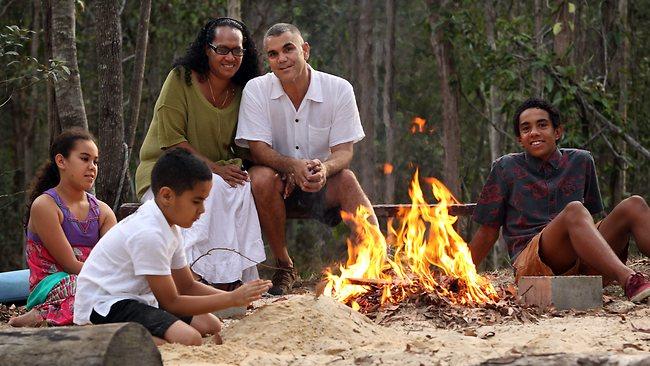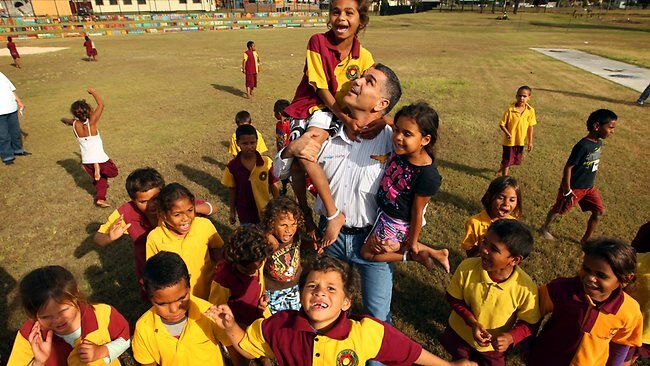Indigenous housing Sarra's next big challenge
RESPECTED Aboriginal educator Chris Sarra plans to leave education to try repairing the troubled area of indigenous housing.

HAVING sparked a wave of reform around the nation based on his "Stronger Smarter" approach to indigenous schools, respected Aboriginal educator Chris Sarra is planning to leave education to try repairing the troubled area of indigenous housing.
In an interview with The Weekend Australian to mark the publication of his memoir, Good Morning, Mr Sarra, Dr Sarra said he had reached a crossroads in his career and wanted to spend more time with his children and wife Grace, a university lecturer in education.
Before Dr Sarra makes any move, he wants to establish the Stronger Smarter Institute as an independent autonomous body.
He is on leave from the institute, which was set up as part of the Queensland University of Technology, and says from January he is unemployed.
While Dr Sarra denies he was pushed out from his position at the university, he is critical of the institute's lack of financial transparency and its levels of bureaucracy.
"It is completely my decision (to leave the education industry). There is a difference of opinion about how to run the institute and I have chosen to walk away," he said.
"I want it (the institute) to have the financial transparency I would call acceptable. There's a perception that we are an indigenous-led institute that's received large amounts of public money and the perception is we are in complete control of that, but the reality is quite different.
"Part of being in a bureaucracy is you don't always get to enjoy being able to execute the level of financial disclosure and transparency I would consider adequate . . . I would like to see the institute independent of bureaucracy."
Dr Sarra said he would not leave education entirely but was interested in adopting the Stronger Smarter approach of pride in Aboriginal culture and high expectations of indigenous people into other areas of social policy.
"One of the things I really like about the Stronger Smarter philosophy is it provides a way of thinking," he said.
"It's a philosophical framework that gets people to think whether they're colluding with a positive Aboriginal identity or colluding with negative stereotypes, whether they're embracing positive leadership or being the victim and booting the victim. It's about contemplating whether or not a high-expectations relationship exists on both sides."
Dr Sarra made his name as principal of Cherbourg State School in southeast Queensland, where he refined his Stronger Smarter philosophy.
Cherbourg had a dysfunctional school and its students had the poorest literacy rates in the state. But under Dr Sarra's leadership, attendance rose from about 60 per cent of students to more than 90 per cent, and students' literacy skills rose to the state average.
His memoir covers Dr Sarra's childhood in Bundaberg as the youngest of 10 to an Aboriginal mother and Italian father, through his education and career, and the lessons he learned that led to the Stronger Smarter philosophy.
"I've got to the point where I've lived the Stronger Smarter philosophy for more than 45 years now, but as an educator. I have executed it in terms of a philosophy in education," he said.
"It's time to spread my wings a bit. I like the idea of working in a space where outcomes are more tangible. Talking to an Aboriginal family about what sort of house they require and four months later handing over a key to the new house and they move in."
Dr Sarra was motivated to write the book after becoming disheartened by the direction indigenous policy was heading, particularly with the Northern Territory intervention and the trials linking welfare payments to school attendance.
"I wanted to put forward a view that was different and more honourable . . . and a more positive perspective of being Aboriginal," he said.
Dr Sarra's interest in indigenous housing was piqued while a member of the federal government's Australian Social Inclusion Board, where he witnessed the same low expectations for Aboriginal housing as he had in indigenous education.
"The culture of complacency that existed in indigenous education exists as readily in the area of indigenous housing. It enables a whole range of people to get away with a lot of unscrupulous dealings," he said.
Dr Sarra is exploring a few models for delivering housing, including private partnerships that would enable indigenous communities to build more suitable houses more quickly.
"I feel like I've paid my pound of flesh as an educator, and possibly a bit more," he said. "I want to concentrate on being a good husband and good father. It's difficult to get the balance right between influencing such an important national agenda and just being a good dad.
"My kids and wife have tolerated that but it's not always fair to them."



